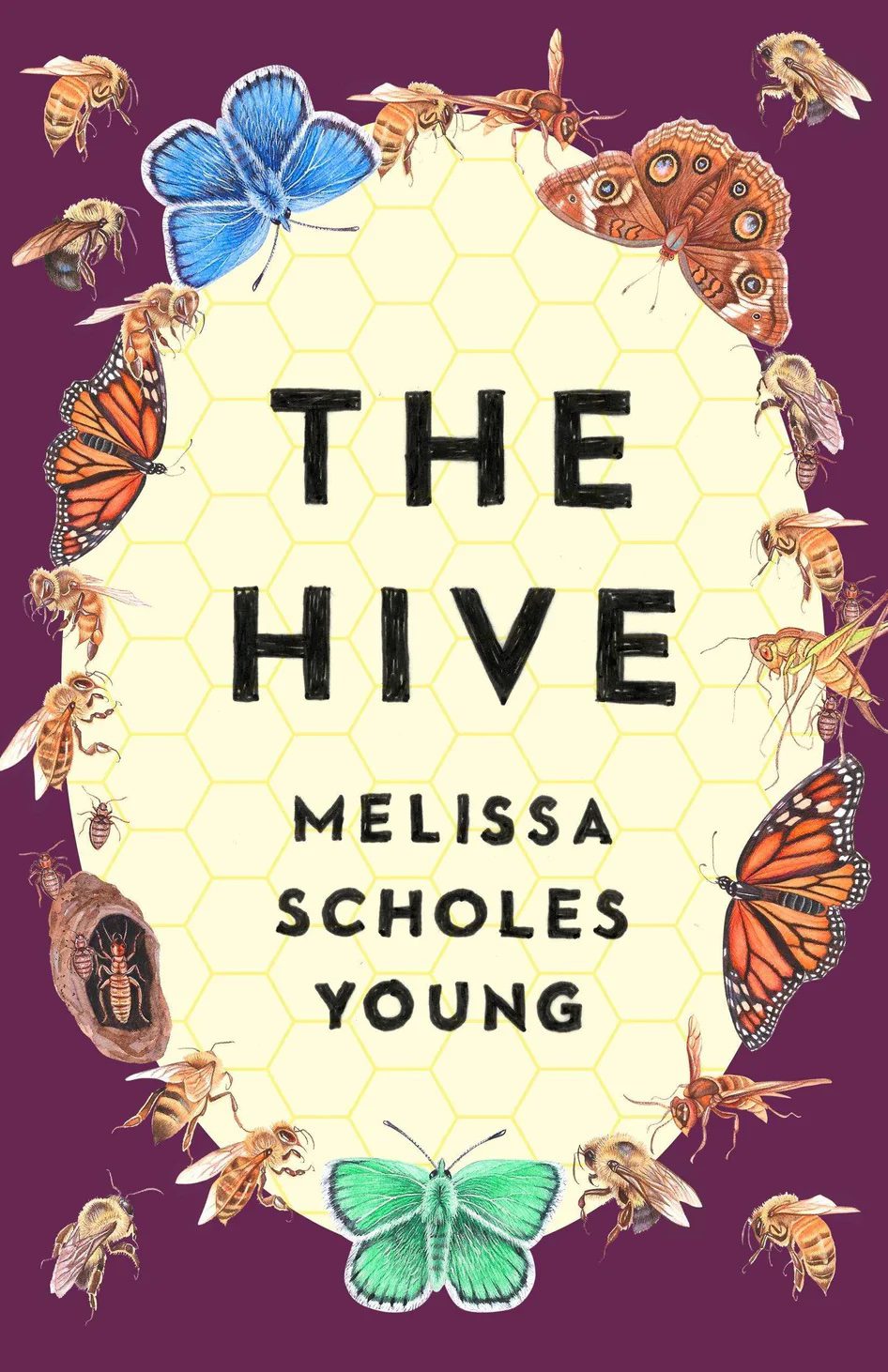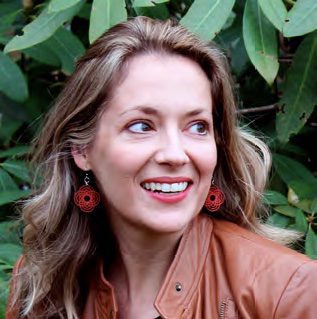
The Hive.
A story of survival, sisters, and secrets.
The Fehler sisters wanted to be more than bug girls but growing up in a fourth- generation family pest control business in rural Missouri, their path was fixed. The family talked about Fehler Family Exterminating at every meal, even when their mom said to separate the business from the family, an impossible task. They tried to escape work with trips to their trailer camp on the Mississippi River, but the sisters did more fighting than fishing. If only there was a son to lead rural Missouri insect control and guide the way through a crumbling patriarchy.

About the Author
Melissa Scholes Young
Melissa Scholes Young is the author of the novels The Hive and Flood, and editor of Grace in Darkness and Furious Gravity, two anthologies by women writers. She is a contributing editor at Fiction Writers Review, and her work has appeared in the Atlantic, Ms., Washington Post, Poets & Writers, Ploughshares, Literary Hub and elsewhere. She has been the recipient of the Bread Loaf Bakeless Camargo Foundation Residency Fellowship and the Center for Mark Twain Studies’ Quarry Farm Fellowship. Born and raised in Hannibal, Missouri, she is now an associate professor in Literature at American University.
Interview with Melissa Scholes Young
Tell us a little bit about yourself.
MSY: I’m a country girl living in a big city. I’m a teacher and I help people tell their stories on the page. I have a dog named Huck, and he’s the best boy ever. I grew up in Hannibal, Missouri, a hometown I share with Mark Twain. I’m a first-generation college student and that means a lot to me. I write about rural communities, class struggles, political fractures, and our connection and threat to land.
Tell us a little bit about The Hive.
MSY: The Hive is a story of class in America and the fates of four sisters and their family business in a politically divided Midwestern town. The Fehlers provide a working-class lens on a complicated family facing a recession. I hope it’s a useful read for our politically divided country in this moment. I believe stories can heal us. We have access to worlds we might not otherwise spend time in. Each of the Fehler women have their own journey and they discover so much about themselves through sudden grief. Many of the family disagreements in the business and the marriage intentionally mirror the debates we’re having as a country about health care and human rights. That existential fear and collective trauma of feeling profound insignificance fuels our political divide. The Fehlers are an example of that in middle America so I wanted to use their dinner table as a safe place to sort what we are facing as a nation. It’s true; you inherit your place, your family, your politics, maybe your religion, but in an examined life, you question those things too. To create an authentic portrait, you have to ask questions and interrogate what you think you know and why.
Where did the inspiration for The Hive come from?
MSY: I attended Prepper Camp, a three-day wilderness skill building workshop in rural North Carolina and interrogated the line between preparedness and paranoia. I went to Prepper Camp thinking it was going to be a gun show, and it turned out to be a survivalist camp. The Fehlers would fit in well there. In one workshop, we walked the forest, and they taught us what we could eat. I learned about bee keeping, composting, and solar energy. Grace is a survivalist who wants to live in conjunction with the land, but she believes in threats that don’t actually exist. When fear justifies ‘othering’ so we can dehumanize, we’ve crossed a dangerous line and Grace gets close to that precipice. She is a fierce mother and will protect her family, but she has to face and to fix herself before she can save the hive.
Did you always know you were going to write this story?
MSY: I always knew the story had to be set in 2008 because I wanted to talk about the recession in middle America. Growing fear, resentment, and blaming of Obama laid a foundation for the election eight years later and the radicalism we see today. Robbie, the patriarch and most problematic member of the hive, longs for the past but it’s really his wrestling for power. He liked the world that was made for him and resists the change that he fears won’t serve him. Robbie’s sudden death makes more room for the five women in the family to grow from their grief.
The Hive is also a story about small businesses in America struggling through recession. This is even more acute in 2021 trying to stay alive through the pandemic uncertainty. Family owned businesses, like the one I grew up in, are the backbone of the American economy. The Fehlers want to take care of their employees. Their employees need healthcare; we all do. It’s a basic human right. But they also know that their business is being bankrupt with the cost. The Fehlers are facing medical bankruptcy through no fault of their own. It’s important to indict institutions rather than people.
Are there any parts of your background or personal life experiences that appeared in your book?
MSY: Like the Fehler sisters, I was raised in a family pest control business in rural Missouri, but this is not my family’s story. I didn’t set out to write the familiar as fiction. I wanted to tell the story of feminism rising from rural roots and to wrestle with the politics of family business succession. Anything that creeped in was by full permission. The story of Robbie and Grace’s honeymoon collecting insects for a pinned collection for his Entomology project is my parent’s story so I asked them if I could use it in the novel. Growing up in a family business, children are necessary labor so writing that came naturally too. I don’t write about the people in my life, but you’ll see their spirit on every page.
Tell us a little bit about the characters and your experience developing each of their story lines and unique perspectives.
MSY: Each of the five Fehler woman have a distinct style but the narrator is consistent throughout the novel. In revision, once the plot was stable, I rewrote each character from beginning to end separately. It took about a month for each but it helped me create consistency in voice. For each plot move, I had to decide whose story it was to tell at that moment. This often meant writing a scene from different voices to learn who had the access we needed for the arc at that moment. The Hive also follows 12 months, 4 Midwestern seasons, and the holy holidays in a Catholic calendar so each had to interact with the story for the structure to hold. The prologue and epilogue are told only by the narrator (rather than close third to a Fehler woman) and they occur with the sisters on the same dock one year a part. Let’s just say I have spreadsheets. Many spreadsheets.
To capture the Fehlers, I approached each family member with curiosity and compassion. Empathy is a writer’s superpower. If you can’t create characters who are authentic in all their glorious flaws on the page, they won’t be compelling for readers. I think stories make us better and writing certainly makes my humanity expand. I write about the Midwestern community that raised me; I’m proud to call them my own but loving something means questioning it too.
Novelists often begin with stories of family because how we’re raised shapes our world view. Peace and conflict within our own walls is just as fascinating and epic as the world outside our nuclear.
Shelf’s staff each ended up identifying with a favorite sister, is someone in the story you would say you relate to the most or a character that is modeled after yourself?
MSY: I’m most interested in Grace because ambivalent mothers rarely get enough pages or round portraits in literary fiction, but truly, I’m rooting for Maggie at the helm of the family business and how she has the power to change the trajectory of the entire family’s future. I related most with Jules because she’s also a first-generation college student and artist. I love that Kate’s finding herself and has the freedom and support to do so. And Tammy dreams big and does things her own way. You’ll see a bit of me in all the Fehler women.
In The Hive, you touch on a vast amount of heavy topics (race, gender, religion, politics, etc.) and seem to use the angle of showing a different perspectives through each of the sisters and mother. Can you tell me a little about this process and your decision to take this approach?
MSY: I’ve always struggled with what we’re not willing to talk about. If you can’t define a problem, you can’t solve it; if we’re not airing the struggle or at least recognizing that not all members of our community are thriving, then it’s not functional to me. This goes against everything I was taught about keeping your business to yourself. When we busy ourselves too much with keeping up appearances, we might not hold enough space for authenticity, intimacy, and engagement with the world bigger than our own. I want to live a life large enough that I have the capacity for worlds and experiences different from my own, but I know plenty of folks who feel more comfortable shutting out that world. It won’t protect them from it, though. We are interconnected and that privacy can be a false front. When I think a character is on a journey, such as Grace, I lift the veil. Grace joins her frantic prepping and fear with her Prepper community. She finds likeminded folks and travels to Prep U under the guise of skill building. At first, she’s comforted by the false front, but when the truth of the precarious line between prepping and paranoia are revealed, she has to wrestle with the harm she might have inflicted on her family, herself, and the larger community she thought she was protecting. Grace is brave to face it, own it, and recalibrate.
Who/ what has had the most influence on you when writing The Hive?
MSY: I was reading a lot about grief actually. Joan Didion’s The Year of Magical Thinking helped me understand the particular work of sudden grief and what it means to sort and reorder a life when someone suddenly dies. Because of my roots in Hannibal, Twain permeates much of my work; I was interested in how Twain evolved as a writer and humanitarian because of the influence of strong, independent women in his life. Much of my research was also into the insect world so I spent time reading pest control magazines and learning the science of bees, bed bugs, and methods for managing them without chemicals.
What’s Next?
MSY: Two things and I seem to be writing the projects simultaneously. My third novel in progress, Restoration, is a story about rebuilding a life by restoring a house. Also, Missy: Dispatches from the Working-Class is a working-class coming of age memoir set in middle America.

[cm_page_title title=”Continue Reading” subtitle=” Shelf Unbound”]
Article originally Published in the December / January 2022 Issue: 2021 Indie Best Award Winners.
